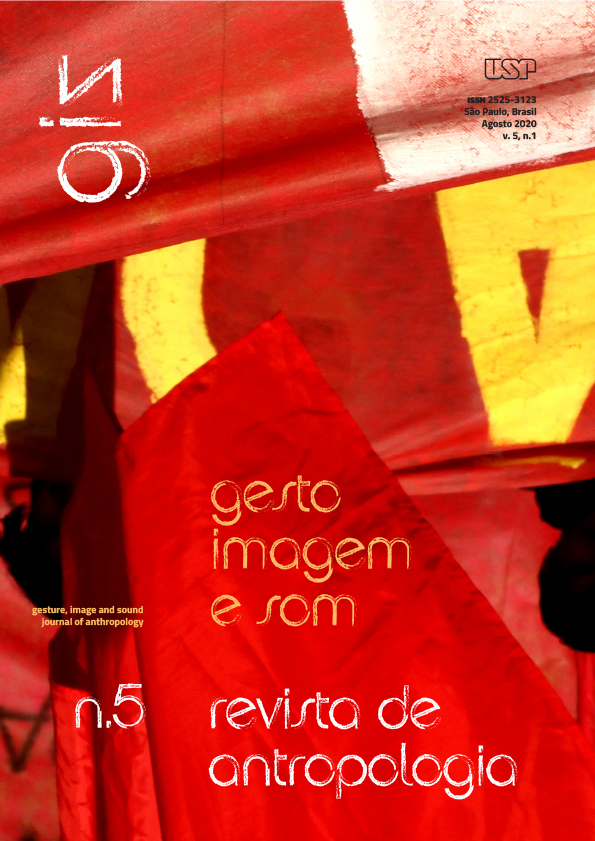O conceito “campeiro” na música regional gaúcha: uma reconfiguração da ordem artístico/cultural
DOI:
https://doi.org/10.11606/issn.2525-3123.gis.2020.164859Palavras-chave:
Campeiro, Transformações, Estética, Ideologia, CulturaResumo
Desde 1971, com a realização do festival 1ª Califórnia da Canção Nativa, a música configura um campo de disputas entre tendências inovadoras e tradicionalistas no Movimento Tradicionalista Gaúcho (MTG), e nas últimas quatro décadas assume um papel central, constituindo-se numa linguagem que agencia transformações nos discursos e na ordem cultural do gauchismo. O conceito “campeiro” aqui mencionado se apresenta como uma reconfiguração da ideia do nativismo, consagrada depois da 1ª Califórnia da Canção Nativa, em uma espécie de transformação de ordem ontológica que aproxima e intensifica a linguagem musical voltada às formas de vida presentes na campanha do sul do Brasil. O material deste artigo surge através de entrevistas e conversas com músicos, poetas e compositores, e artistas que participam de eventos de música regional gaúcha.
Downloads
Referências
Côrtes, João Carlos D’Ávila Paixão. 1985. Aspectos da música e fonografia gaúchas. Porto Alegre: Represom.
Cunha, Manuela Carneiro da. 2009. Cultura com aspas. São Paulo: Cosac Naify.
Descola, Philippe. 2013. A antropologia da natureza: entrevista. Topoi, Rio de Janeiro, Vol. 14, nº 27, p. 495-517, jul./dez. DOI: http://dx.doi.org/10.1590/2237-101X014027013.
Dumont, Louis. 2000. O individualismo. Uma perspectiva antropológica da ideologia moderna. Rio de Janeiro: Rocco.
Ferraro, Eduardo Hector. 2006. A música nativista do sul do Brasil: panorama histórico e gêneros de comunicação com o folclore rio-platense. Trabalho de conclusão do curso de Licenciatura em Música, Universidade do Estado de Santa Catarina, Florianópolis.
Ferraro, Eduardo Hector. 2013. Transformações culturais no gauchismo através da música. 205 p. Dissertação de Mestrado. Universidade Federal de Santa Catarina, Florianópolis.
Ferraro, Eduardo Hector. 2018. Ser ou não ser gaúcho? A perspectiva do sujeito campeiro contemporâneo no pampa latino-americano. 290 p. Tese de doutorado - Universidade Federal de Santa Catarina, Florianópolis, 2018.
Ferreira, Clarissa Figueiró. 2014. Campeirismo musical e os festivais de música nativista no Sul do Brasil: a (pós)modernidade re(construindo) o “gaúcho de verdade”. 155p. Dissertação de mestrado. Universidade Federal do Rio Grande do Sul, Porto Alegre.
Feuchtwang, Stephan. 2014. Too ontological, too rigid, too ahistorical but magnificent. Hau: Journal of Ethnographic Theory, Vol. 4, nº 3, p. 383-387. Disponível em: https://doi.org/10.14318/hau4.3.025.
Guerrero, Juliana. 2012. El género musical en la música popular: algunos problemas para su caracterización. In: Trans: Revista Transcultural de música. Nº 16, 1-22 Disponível em: <https://bit.ly/2XVLxsN>. Acesso em: 12/10/2019.
Golin, Tau. 1983. A Ideologia do Gauchismo. Porto Alegre: Tchê.
Holbraad, Martin; Pedersen, Morten Axel; Viveiros De Castro, Eduardo. 2014. The Politics of Ontology: anthropological positions. Fieldsigths, 13 jan. Disponível em: <https://bit.ly/36EBhJu> Acesso em: 04/01/ 2018.
Ingold, Tim. 2000. The perception of the environment. Essays on livelihood, dwelling and skill. London: Routledge,
Lessa, Luís Carlos Barbosa. 1985. Nativismo: Um fenômeno social gaúcho. Porto Alegre: L&PM,
Lessa, Luís Carlos Barbosa e Côrtes, João Carlos D’Avila Paixão. 1975. Danças e andanças da tradição gaúcha. Porto Alegre: Garatuja, 2ª ed.
Marcuse, Herbert. 2000. A dimensão estética. Lisboa: Edições 70.
Santi, Álvaro. 2004. Do Partenon à Califórnia: o nativismo e suas origens. Porto Alegre: Ed. UFRGS.
Wallace, Anthony. 1956. Revitalizations Movements. American Anthropologist. Vol 58 nº 2. p 264-281. https://doi.org/10.1525/aa.1956.58.2.02a00040.
Žižek, Slavoj. (org.) 1996. Um Mapa da ideologia. Rio de Janeiro: Contraponto.
Downloads
Publicado
Edição
Seção
Licença
Autores que publicam nesta revista concordam com os seguintes termos:
- Autores mantém os direitos autorais e concedem à revista o direito de primeira publicação, com o trabalho simultaneamente licenciado sob a Licença Creative Commons Attribution BY-NC-ND que permite o compartilhamento do trabalho com reconhecimento da autoria e publicação inicial nesta revista para fins não comerciais.
- Autores têm autorização para assumir contratos adicionais separadamente, para distribuição não-exclusiva da versão do trabalho publicada nesta revista (ex.: publicar em repositório institucional ou como capítulo de livro), com reconhecimento de autoria e publicação inicial nesta revista.







